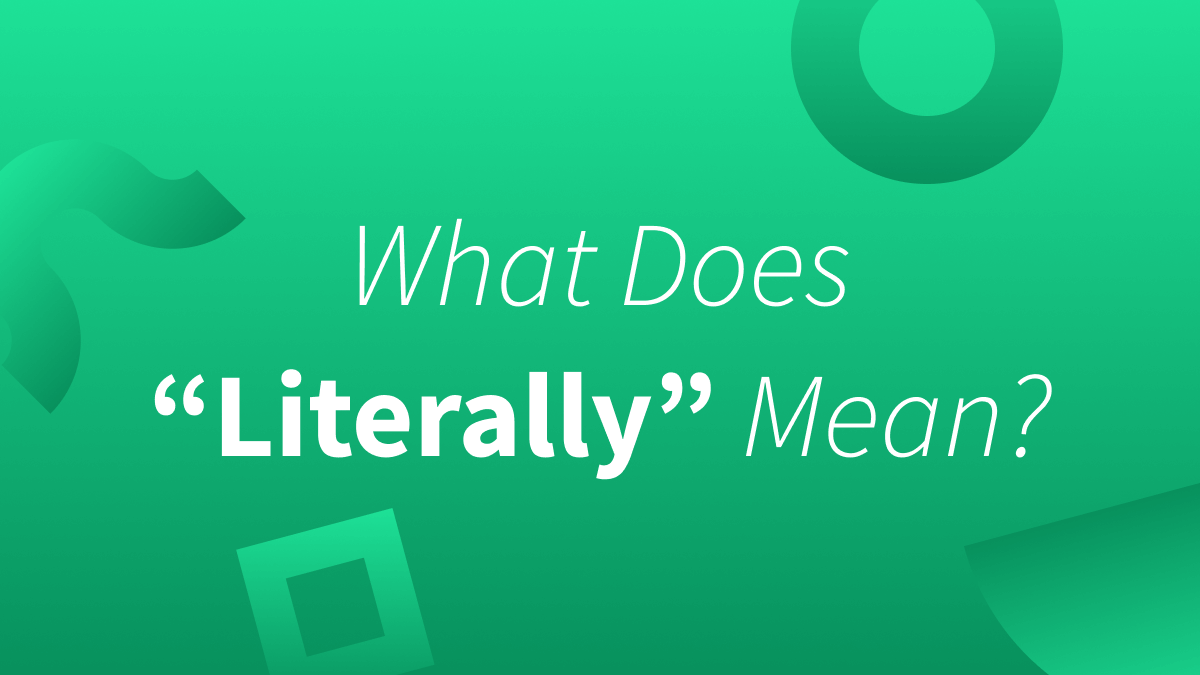Quick Summary
The word literally means “actually” or “in a literal sense,” but it can also mean “virtually or in an exaggerated way.”
Table of Contents
When it comes to English, there’s probably no topic more controversial than the use of the word literally. While one side fervently claims that there’s only one meaning, the other believes that words can evolve and have multiple definitions.
But who’s right? That’s what we’re here to uncover as we explore what one major linguistic authority has to say about the word literally.
What Does “Literally” Mean?
A quick online search will show you that literally is an adverb that means “in a literal sense,” which is to say, “in a completely accurate way.” Think of it as a synonym for “actually.”
When Evelyn claimed the company was on fire, she meant it literally; the main office was engulfed in flames.
The fireworks literally lit up the sky.
The lake literally froze overnight because the temperature dropped so rapidly.
However, if you check the Merriam-Webster dictionary, you’ll notice that it includes multiple definitions, one being “virtually; used in an exaggerated way to emphasize a statement or description that is not literally true or possible.”
I’m so hungry that I could literally eat a horse.
The book was so popular that copies were literally flying off the shelf.
It’s so hot; I feel like I’m literally melting into this sidewalk.
Wait, what? How can the word literally have two contradictory meanings? Remember, this is English we’re dealing with. There are plenty of words, known as contronyms, that have opposite definitions. Knowing that, literally can technically be considered a contronym.
But the second definition must be some new-age use that only recently became popular, right?
Actually, no. According to Merriam-Webster, using literally to add emphasis has been around since the 18th century and can be found in many renowned writers’ works, including Mark Twain, James Joyce, and many others.
Lily, the caretaker's daughter, was literally run off her feet. Hardly had she brought one gentleman into the little pantry … than the wheezy hall-door bell clanged again and she had to scamper along the bare hallway to let in another guest.
—James Joyce, Dubliners, 1914
So, if you’re looking for a straightforward answer on what literally means, here it is: Literally can mean “actually or in a literal and accurate sense,” but it can also mean “virtually and in an exaggerated way.”
Synonyms for “Literally”
You should know that a few words carry similar connotations when using literally to mean “in a literal sense.”
Actually
Jeff actually ran the marathon in under three hours, as he said he would.
Jeff literally ran the marathon in under three hours, as he said he would.
Exactly
Cecilia followed the recipe exactly as it was written.
Cecilia followed the recipe literally as it was written.
Factually
The story was factually correct in every detail.
The story was literally correct in every detail.
Precisely
The fireworks began precisely at twelve.
The fireworks began literally at twelve.
Really
Some synonyms carry similar meanings to literally when used to mean “virtually and in an exaggerated way.”
Jordan and the kids said they really saw a shooting star last night.
Jordan and the kids said they literally saw a shooting star last night.
Essentially
These days, kids are essentially glued to their smartphones all day.
These days, kids are literally glued to their smartphones all day.
Figuratively
She figuratively died of laughter.
She literally died of laughter.
Effectively
They effectively lived at the headquarters during the start of the project.
They literally lived at the headquarters during the start of the project.
Practically
The beach town was practically completely underwater after the hurricane.
The beach town was literally completely underwater after the hurricane.
How To Use the Word “Literally” Correctly
You came here looking for answers on how to use the word literally correctly, so here’s what we recommend:
When writing or speaking in a professional or academic setting, only use literally in its primary meaning, “in an accurate or literal sense.” But in casual conversations, you don’t have to correct the use of literally when you or someone else uses it to mean “in effect or virtually.” Grammar purists may be seething at this recommendation, but bear in mind that the contested use of the word literally has been around since the 18th century.
Yes, the multiple meanings of literally further prove how exasperating the English language can be. Luckily, there’s a way to ensure pristine word usage in your written work: by trusting LanguageTool’s paraphrasing tool. As an advanced, AI-driven writing assistant, this tool checks for spelling, grammar, and punctuation errors, and enhances style by optimizing tone and word choice.
Try it today to literally take your writing to the next level.

